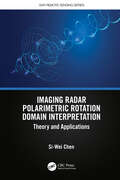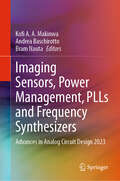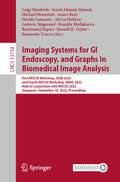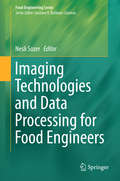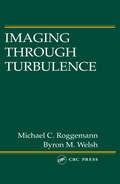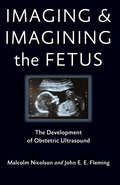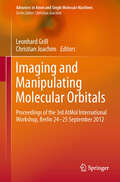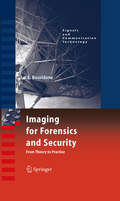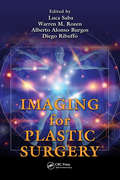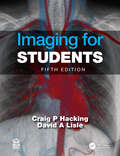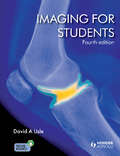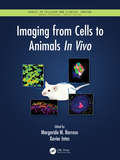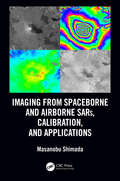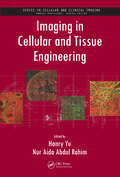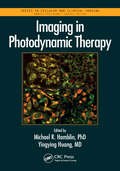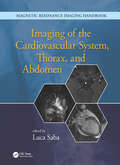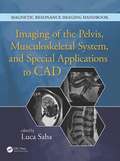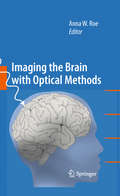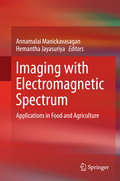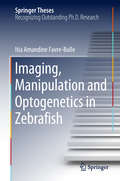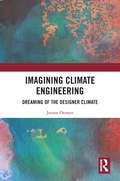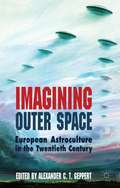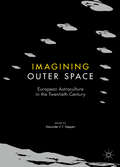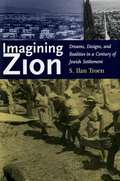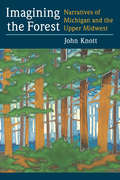- Table View
- List View
Imaging Radar Polarimetric Rotation Domain Interpretation: Theory and Applications (SAR Remote Sensing)
by Si-Wei ChenPolarimetric rotation domain interpretation is an innovation in radar image processing and understanding. Orientation rotation is a basic operator well known in the classic polarimetry theory, and significant advancement has been made in recent years. This book presents new and advanced concepts, theories, and methodologies in radar polarimetry and bridges the gaps between target scattering diversity, polarimetric radar data, and their practical applications. It provides a comprehensive summarization and investigation of polarimetric rotation domain features and demonstrates novel applications of polarimetric radar target detection, classification, target structure recognition, and urban damage mapping.FEATURES Focuses on basic concepts, key techniques, and various applications of the polarimetric rotation domain interpretation paradigm for the first time in book form Explains, represents, and utilizes the radar target scattering diversity effect Identifies new methods for target polarimetric scattering mechanism understanding Provides a comprehensive investigation of polarimetric roll-invariant features Includes novel application developments for imaging radar target detection, structure recognition, and damage mapping This book is written for researchers and professionals in radar polarimetry, radar imaging, microwave remote sensing, environmental studies, and other related fields. Senior undergraduate and postgraduate students, as well as teachers in the same fields, will benefit from the advancements highlighted in this book.
Imaging Sensors, Power Management, PLLs and Frequency Synthesizers: Advances in Analog Circuit Design 2023
by Bram Nauta Kofi A. A. Makinwa Andrea BaschirottoThis book is based on the 18 tutorials presented during the 31st workshop on Advances in Analog Circuit Design held in Villach, Austria. In it, expert designers share their insights on a variety of topics at the frontier of analog circuit design, with specific contributions focusing on the design of imaging sensors, power management circuits, PLLs and frequency synthesizers. As such, for anyone involved in analog circuit research and development, this book provides a valuable overview of the state-of-the-art.
Imaging Systems for GI Endoscopy, and Graphs in Biomedical Image Analysis: First MICCAI Workshop, ISGIE 2022, and Fourth MICCAI Workshop, GRAIL 2022, Held in Conjunction with MICCAI 2022, Singapore, September 18, 2022, Proceedings (Lecture Notes in Computer Science #13754)
by Emanuele Trucco Bartlomiej Papiez Davide Lomanto Russell H. Taylor Luigi Manfredi Seyed-Ahmad Ahmadi Michael Bronstein Anees Kazi Alwyn Mathew Ludovic Magerand Kamilia MullakaevaThis book constitutes the refereed proceedings of the first MICCAI Workshop, ISGIE 2022, Imaging Systems for GI Endoscopy, and the Fourth MICCAI Workshop, GRAIL 2022, GRaphs in biomedicAL Image and analysis, held in conjunction with MICCAI 2022, Singapore, September 18, 2022.ISGIE 2022 accepted 6 papers from the 8 submissions received.This workshop focuses on novel scientific contributions to vision systems, imaging algorithms as well as the autonomous system for endorobot for GI endoscopy. This includes lesion and lumen detection, as well as 3D reconstruction of the GI tract and hand-eye coordination. GRAIL 2022 accepted 6 papers from the 10 submissions received. The workshop aims to bring together scientists that use and develop graph-based models for the analysis of biomedical images and to encourage the exploration of graph-based models for difficult clinical problems within a variety of biomedical imaging contexts.
Imaging Technologies and Data Processing for Food Engineers
by Nesli SozerFood products are complex in nature which makes their analysis difficult. Different scientific disciplines such as biochemistry, microbiology, and nutrition, together with engineering concepts are involved in their characterization. However, imaging of food materials and data analysis has gained more importance due to innovations in the food industry, as well as the emergence of food nanotechnology. Image analysis protocols and techniques can be used in food structure analysis and process monitoring. Therefore, food structure imaging is crucial for various sections of the food chain starting from the raw material to the end product. This book provides information on imaging techniques such as electron microscopy, laser microscopy, x-ray tomography, raman and infrared imaging, together with data analysis protocols. It addresses the most recent advances in imaging technologies and data analysis of grains, liquid food systems (i. e. emulsions and gels), semi-solid and solid foams (i. e. bakery products, dough, expanded snacks), protein films, fruits and vegetable confectionery and nuts. This book also: Provides in-depth view of raw material characterization and process control Covers structure-functionality and structure-texture relationships Reviews applications to emerging areas of food science with an insight into future trends
Imaging Through Turbulence
by Michael C. Roggemann Byron M. WelshLearn how to overcome resolution limitations caused by atmospheric turbulence in Imaging Through Turbulence. This hands-on book thoroughly discusses the nature of turbulence effects on optical imaging systems, techniques used to overcome these effects, performance analysis methods, and representative examples of performance. Neatly pulling together widely scattered material, it covers Fourier and statistical optics, turbulence effects on imaging systems, simulation of turbulence effects and correction techniques, speckle imaging, adaptive optics, and hybrid imaging. Imaging Through Turbulence is written in tutorial style, logically guiding you through these essential topics. It helps you bring down to earth the complexities of coping with turbulence.
Imaging and Imagining the Fetus: The Development of Obstetric Ultrasound
by Malcolm Nicolson John E. FlemingHow engineers and clinicians developed the ultrasound diagnostic scanner and how its use in obstetrics became controversial.To its proponents, the ultrasound scanner is a safe, reliable, and indispensable aid to diagnosis. Its detractors, on the other hand, argue that its development and use are driven by the technological enthusiasms of doctors and engineers (and the commercial interests of manufacturers) and not by concern to improve the clinical care of women. In some U.S. states, an ultrasound scan is now required by legislation before a woman can obtain an abortion, adding a new dimension to an already controversial practice. Imaging and Imagining the Fetus engages both the development of a modern medical technology and the concerted critique of that technology.Malcolm Nicolson and John Fleming relate the technical and social history of ultrasound imaging—from early experiments in Glasgow in 1956 through wide deployment in the British hospital system by 1975 to its ubiquitous use in maternity clinics throughout the developed world by the end of the twentieth century. Obstetrician Ian Donald and engineer Tom Brown created ultrasound technology in Glasgow, where their prototypes were based on the industrial flaw detector, an instrument readily available to them in the shipbuilding city. As a physician, Donald supported the use of ultrasound for clinical purposes, and as a devout High Anglican he imbued the images with moral significance. He opposed abortion—decisions about which were increasingly guided by the ultrasound technology he pioneered—and he occasionally used ultrasound images to convince pregnant women not to abort the fetuses they could now see.Imaging and Imagining the Fetus explores why earlier innovators failed where Donald and Brown succeeded. It also shows how ultrasound developed into a "black box" technology whose users can fully appreciate the images they produce but do not, and have no need to, understand the technology, any more than do users of computers. These "images of the fetus may be produced by machines," the authors write, "but they live vividly in the human imagination."
Imaging and Manipulating Molecular Orbitals: Proceedings of the 3rd AtMol International Workshop, Berlin 24-25 September 2012
by Christian Joachim Leonard GrillImaging and Manipulating Molecular Orbitals celebrates the 60th anniversary of the first image of a single molecule by E. Müller. This book summarizes the advances in the field from various groups around the world who use a broad range of experimental techniques: scanning probe microscopy (STM and AFM), field emission microscopy, transmission electron microscopy, attosecond tomography and photoemission spectroscopy. The book is aimed at those who are interested in the field of molecular orbital imaging and manipulation. Included in the book are a variety of experimental techniques in combination with theoretical approaches which describe the spatial distribution and energies of the molecular orbitals. The goal is to provide the reader with an up-to-date summary on the latest developments in this field from various points of view.
Imaging for Forensics and Security
by Ahmed BouridaneImaging for Forensics and Security: From Theory to Practice provides a detailed analysis of new imaging and pattern recognition techniques for the understanding and deployment of biometrics and forensic techniques as practical solutions to increase security. It contains a collection of the recent advances in the technology ranging from theory, design, and implementation to performance evaluation of biometric and forensic systems. This book also contains new methods such as the multiscale approach, directional filter bank, and wavelet maxima for the development of practical solutions to biometric problems. The book introduces a new forensic system based on shoeprint imagery with advanced techniques for use in forensics applications. It also presents the concept of protecting the originality of biometric images stored in databases against intentional and unintentional attacks and fraud detection data in order to further increase the security.
Imaging for Plastic Surgery
by Luca Saba Warren M. Rozen Alberto Alonso-Burgos Diego RibuffoPreoperative imaging is increasingly being adopted for preoperative planning in plastic and reconstructive surgery. Accurate preoperative analysis can reduce the length of operations and maximize surgical design and dissection techniques. Imaging for Plastic Surgery covers the techniques, applications, and potentialities of medical imaging technology in plastic and reconstructive surgery. Presenting state-of-the-art research on evolving imaging modalities, this cutting-edge text: Provides a practical introduction to imaging modalities that can be used during preoperative planning Addresses imaging principles of the face, head, neck, breast, trunk, and extremities Identifies the strengths and weaknesses of all available imaging modalities Demonstrates the added value of imaging in different clinical scenarios Comprised of contributions from world-class experts in the field, Imaging for Plastic Surgery is an essential imaging resource for surgeons, radiologists, and patient care professionals.
Imaging for Students
by David Lisle Craig Hacking'I would have found this book invaluable at medical school, but as a now qualified GP I think it is a fabulous resource. The fact it covers so much is remarkable … It is so comprehensive – great images, well explained.' Donna Pilkington, GP with an interest in medical education, Northern Ireland, UK 'It is direct and succinct. Just what you need in a portable book that aims to give you the essentials [it does] a great job of incorporating a huge amount of information covering the wide range of radiology examinations and procedures into a readable and practical book for students. A good introduction for year 1 radiology residents too.' Dr Mike Hurrell, Clinical Senior Lecturer and Consultant Radiologist, University of Otago, Christchurch, New Zealand 'The text works very well for the Medical Imaging Students – providing an overview of each modality and key insights into the clinical question to be resolved … the information is presented in an accessible fashion and well-illustrated.' Associate Professor Debbie Starkey, Discipline Leader, Medical Radiation Sciences, School of Clinical Sciences, Faculty of Health, Queensland University of Technology, Brisbane, Australia Imaging for Students delivers step-by-step guidance to the range of imaging techniques available, providing a clear explanation of how each imaging modality actually works, and including information on the associated risks and hazards. Throughout, the importance of patient preparation and post-procedure observation is emphasized. Taking information from evidence-based studies and published guidelines, in line with current clinical practice, the book takes a highly logical approach to the investigation of clinical scenarios, where possible indicating the 'best first test'—vital to both appropriate clinical and cost-effective decision-making. Key Features: Readable and concise – focusing on the common diseases that medical students most frequently encounterFully revised and updated – including up-to-date information on the latest imaging techniques including spectral CT, liver elastography, new and emerging PET techniques, multiparametric imaging and the role of AIHeavily illustrated - over 450 high-quality photographs, many new to this edition including colour images, are essential to support this visual subjectHighly structured and accessible format – plentiful use of tables and lists, and introduction of new summary boxes, all ideal for study and exam preparationCompanion website – image library including normal anatomy, clinical cases and MCQs for self-assessment, RADS reporting systems and detailed staging systems for common tumours relevant to each section; visit www.routledge.com/cw/hacking Drawing on the extensive clinical and teaching experience of its respected author team, the fifth edition of Imaging for Students gives students and junior doctors everything they need to understand the advantages, disadvantages, and possible side effects of the imaging modalities available, and how to apply them appropriately in clinical practice. The Authors: Craig Hacking is an Associate Professor of Radiology and Academic Lead for Clinical Radiology, University of Queensland Medical School and a Consultant Radiologist and the Medical Director of Medical Imaging at the Royal Brisbane and Women’s Hospital, Brisbane, Australia. David Lisle is an Associate Professor of Medical Imaging, University of Queensland Medical School, a Consultant Radiologist at Brisbane Private Hospital, Brisbane, Australia, an examiner for the Royal Australian and New Zealand College of Radiologists and is the author of previous editions of Imaging for Students. </
Imaging for Students
by David A LisleImaging for Students delivers step-by-step guidance to the range of imaging techniques available, providing a clear explanation of how each imaging modality actually works, and including information on the associated risks and hazards. Throughout, the importance of patient preparation and post-procedure observation is emphasized.Taking information
Imaging from Cells to Animals In Vivo (Series in Cellular and Clinical Imaging)
by Margarida M. Barroso and Xavier IntesThis book offers an overview of imaging techniques used to investigate cells and tissue in their native environment. It covers the range of imaging approaches used, as well as the application of those techniques to the study of biological processes in cells and whole tissues within living organisms.
Imaging from Spaceborne and Airborne SARs, Calibration, and Applications (SAR Remote Sensing)
by Masanobu ShimadaSixty years after its birth, Synthetic Aperture Radar (SAR) evolved as a key player of earth observation, and it is continually upgraded by enhanced hardware functionality and improved overall performance in response to user requirements. The basic information gained by SAR includes the backscattering coefficient of targets, their phases (the truncated distance between SAR and its targets), and their polarization dependence. The spatiotemporal combination of the multiple data operated on the satellite or aircraft significantly increases its sensitivity to detect changes on earth, including temporal variations of the planet in amplitude and the interferometric change for monitoring disasters; deformations caused by earthquakes, volcanic activity, and landslides; environmental changes; ship detection; and so on. Earth-orbiting satellites with the appropriate sensors can detect environmental changes because of their large spatial coverage and availability. Imaging from Spaceborne and Airborne SARs, Calibration, and Applications provides A-to-Z information regarding SAR researches through 15 chapters that focus on the JAXA L-band SAR, including hardware description, principles of SAR imaging, theoretical description of SAR imaging and error, ScanSAR imaging, polarimetric calibration, inflight antenna pattern, SAR geometry and ortho rectification, SAR calibration, defocusing for moving targets, large-scale SAR imaging and mosaic, interferometric SAR processing, irregularities, application, and forest estimation. Sample data are created by using L-band SAR, JERS-1, PALSAR, PALSAR-2, and Pi-SAR-L2. This book is based on the author’s experience as a principal researcher at JAXA with responsibilities for L-band SAR operation and researches. It reveals the inside of SAR processing and application researches performed at JAXA, which makes this book a valuable reference for a wide range of SAR researchers, professionals, and students.
Imaging in Cellular and Tissue Engineering
by Hanry Yu Nur Aida Abdul RahimDetails on specific imaging modalities for different cellular and tissue engineering applications are scattered throughout articles and chapters in the literature. Gathering this information into a single reference, Imaging in Cellular and Tissue Engineering presents both the fundamentals and state of the art in imaging methods, approaches, and app
Imaging in Photodynamic Therapy (Series in Cellular and Clinical Imaging)
by Michael R. Hamblin Yingying HuangThis book covers the broad field of cellular, molecular, preclinical, and clinical imaging either associated with or combined with photodynamic therapy (PDT). It showcases how this approach is used clinically for cancer, infections, and diseases characterized by unwanted tissue such as atherosclerosis or blindness. Because the photosensitizers are also fluorescent, the book also addresses various imaging systems such as confocal microscopy and small animal imaging systems, and highlights how they have been used to follow and optimize treatment, and to answer important mechanistic questions. Chapters also discuss how imaging has made important contributions to clinical outcomes in skin, bladder, and brain cancers, as well as in the development of theranostic agents for detection and treatment of disease. This book provides a resource for physicians and research scientists in cell biology, microscopy, optics, molecular imaging, oncology, and drug discovery.
Imaging of the Cardiovascular System, Thorax, and Abdomen
by Luca SabaMagnetic resonance imaging (MRI) is a technique used in biomedical imaging and radiology to visualize internal structures of the body. Because MRI provides excellent contrast between different soft tissues, the technique is especially useful for diagnostic imaging of the brain, muscles, and heart. <P><P>In the past 20 years, MRI technology has improved significantly with the introduction of systems up to 7 Tesla (7 T) and with the development of numerous post-processing algorithms such as diffusion tensor imaging (DTI), functional MRI (fMRI), and spectroscopic imaging. From these developments, the diagnostic potentialities of MRI have improved impressively with an exceptional spatial resolution and the possibility of analyzing the morphology and function of several kinds of pathology. <P><P>Given these exciting developments, the Magnetic Resonance Imaging Handbook: Imaging of the Cardiovascular System, Thorax, and Abdomen is a timely addition to the growing body of literature in the field. Offering comprehensive coverage of cutting-edge imaging modalities, this book: <Li>Discusses MRI of the heart, blood vessels, lungs, breasts, diaphragm, liver, gallbladder, spleen, pancreas, adrenal glands, and gastrointestinal tract <Li>Explains how MRI can be used in vascular, posttraumatic, postsurgical, and computer-aided diagnostic (CAD) applications <Li>Highlights each organ’s anatomy and pathological processes with high-quality images <Li>Examines the protocols and potentialities of advanced MRI scanners such as 7 T systems <Li>Includes extensive references at the end of each chapter to enhance further study <P><P>Thus, the Magnetic Resonance Imaging Handbook: Imaging of the Cardiovascular System, Thorax, and Abdomen provides radiologists and imaging specialists with a valuable, state-of-the-art reference on MRI.
Imaging of the Pelvis, Musculoskeletal System, and Special Applications to CAD
by Luca SabaMagnetic resonance imaging (MRI) is a technique used in biomedical imaging and radiology to visualize internal structures of the body. Because MRI provides excellent contrast between different soft tissues, the technique is especially useful for diagnostic imaging of the brain, muscles, and heart.In the past 20 years, MRI technology has improved si
Imaging the Brain with Optical Methods
by Anna W. RoeThe technology of detecting and interpreting patterns of reflected light has reached a remarkable degree of maturity that now permits high spatial and temporal resolution visualization at both the systems and cellular levels. There now exist several optical imaging methodologies, based on either hemodynamic changes in nervous tissue or neurally-induced light scattering changes, that can be used to measure ongoing activity in the brain. In two parts, Imaging the Brain with Optical Methods discusses the history of optical imaging and its use in the study of brain function, and the rapidly developing optical technologies and their applications that have recently developed. These include intrinsic signal optical imaging, near-infrared optical imaging, fast optical imaging based on scattered light, optical imaging with voltage sensitive dyes, and 2 photon imaging of hemodynamic signals. In total, this volume will encapsulate the current state of optical imaging methodologies and their contribution towards understanding the spatial and temporal organization of cerebral cortical function.
Imaging with Electromagnetic Spectrum
by Annamalai Manickavasagan Hemantha JayasuriyaThis book demonstrates how imaging techniques, applying different frequency bands from the electromagnetic spectrum, are used in scientific research. Illustrated with numerous examples this book is structured according to the different radiation bands: From Gamma-rays over UV and IR to radio frequencies. In order to ensure a clear understanding of the processing methodologies, the text is enriched with descriptions of how digital images are formed, acquired, processed and how to extract information from them. A special emphasis is given to the application of imaging techniques in food and agriculture research.
Imaging, Manipulation and Optogenetics in Zebrafish (Springer Theses)
by Itia Amandine Favre‐BulleThe work described here investigates the advantages and limitations of using laser light for the deep in-vivo illumination and micromanipulation of the neuronal system in zebrafish. To do so, it combines and develops novel optical methods such as optogenetics, light sheet microscopy and optical micromanipulation. It also demonstrates, for the first time, that directional and focused laser beams can successfully be used to target large objects at considerable depth in a living organism to exert purely optical force – in this case on otoliths (ear stones) – and create fictive vestibular stimuli in a stationary animal. The behavioural study and simultaneous imaging of the whole brain reveal the location of the brain cells specific to each ear stone. Elucidating these fundamental neural processes holds substantial value for basic neuroscience researchers, who still have only a vague grasp of how brain circuits mediate perception. As such, it represents highly innovative research that has already led to high-impact publications and is now being intensively pursued.
Imagining Climate Engineering: Dreaming of the Designer Climate
by Jeroen OomenThis book highlights the increasing attention for climate engineering, a set of speculative technologies aimed to counter global warming. What is the future of the global climate? And who gets to decide—or even design—this future? Imagining Climate Engineering explores how and why climate engineering became a potential approach to anthropogenic climate change. Specifically, it showcases how views on the future of climate change and climate engineering evolved by addressing the ways in which climate engineers view its respective physical, political, and moral domains. Tracing the intellectual and political history of dreams to control the weather and climate as well as the discovery of climate change, Jeroen Oomen examines the imaginative parameters within which contemporary climate engineering research takes place. Introducing the analytical metaphor ‘ways of seeing’ to describe explicit or implicit visions, understandings, and foci that facilitate a particular understanding of what is at stake, Imagining Climate Engineering shows how visions on the knowability of climate tie into moral and political convictions about the possibility and desirability of engineering the climate. Marrying science and technology studies and the environmental humanities, Oomen provides crucial insights for the future of the climate change debate for scholars and students.
Imagining Outer Space
by Alexander C. T. GeppertImagining Outer Space makes a captivating advance into the cultural history of outer space and extraterrestrial life in the European imagination. How was outer space conceived and communicated? What promises of interplanetary expansion and cosmic colonization propelled the project of human spaceflight to the forefront of twentieth-century modernity? In what way has West-European astroculture been affected by the continuous exploration of outer space? Tracing the current thriving interest in spatiality to early attempts at exploring imaginary worlds beyond our own, the book's authors analyze contact points between science and fiction from a transdisciplinary perspective and examine sites and situations where utopian images and futuristic technologies contributed to the omnipresence of fantasmatic thought. Bringing together state-of-the-art work in this emerging field of historical research, thevolumebreaks new ground in the historicization of the Space Age. "
Imagining Outer Space: European Astroculture In The Twentieth Century (Palgrave Studies in the History of Science and Technology)
by Alexander C.T. GeppertImagining Outer Space makes a captivating advance into the cultural history of outer space and extraterrestrial life in the European imagination. How was outer space conceived and communicated? What promises of interplanetary expansion and cosmic colonization propelled the project of human spaceflight to the forefront of twentieth-century modernity? In what way has West-European astroculture been affected by the continuous exploration of outer space? Tracing the thriving interest in spatiality to early attempts at exploring imaginary worlds beyond our own, the book analyzes contact points between science and fiction from a transdisciplinary perspective and examines sites and situations where utopian images and futuristic technologies contributed to the omnipresence of fantasmatic thought. Bringing together state-of-the-art work in this emerging field of historical research, the volume breaks new ground in the historicization of the Space Age.
Imagining Zion: Dreams, Designs, and Realities in a Century of Jewish Settlement
by S. Ilan TroenThis timely book tells the fascinating story of how Zionists colonizers planned and established nearly 700 agricultural settlements, towns, and cities from the 1880s to the present. This extraordinary activity of planners, architects, social scientists, military personnel, politicians, and settlers is inextricably linked to multiple contexts: Jewish and Zionist history, the Arab/Jewish conflict, and the diffusion of European ideas to non-European worlds. S. Ilan Troen demonstrates how professionals and settlers continually innovated plans for both rural and urban frontiers in response to the competing demands of social and political ideologies and the need to achieve productivity, economic independence, and security in a hostile environment. In the 1930s, security became the primary challenge, shaping and even distorting patterns of growth. Not until the 1993 Oslo Accords, with prospects of compromise and accommodation, did planners again imagine Israel as a normal state, developing like other modern societies. Troen concludes that if Palestinian Arabs become reconciled to a Jewish state, Israel will reassign priority to the social and economic development of the country and region.
Imagining the Forest // Narratives of Michigan and the Upper Midwest
by John Knott"Forests have always been more than just their trees. The forests in Michigan (and similar forests in other Great Lakes states such as Wisconsin and Minnesota) played a role in the American cultural imagination from the beginnings of European settlement in the early 19th century to the present. Our relationships with those forests have been shaped by the cultural attitudes of the times, and people have invested in them both moral and spiritual meanings. Author John Knott draws upon such works as Simon Schama's Landscape and Memory and Robert Pogue Harrison's Forests: The Shadow of Civilization in exploring ways in which our relationships with forests have been shaped, using Michigan-its history of settlement, popular literature, and forest management controversies-as an exemplary case. Knott looks at such well-known figures as William Bradford, James Fenimore Cooper, John Muir, John Burroughs, and Teddy Roosevelt; Ojibwa conceptions of the forest and natural world (including how Longfellow mythologized them); early explorer accounts; and contemporary literature set in the Upper Peninsula, including Jim Harrison's True North and Philip Caputo's Indian Country. Two competing metaphors evolved over time, Knott shows: the forest as howling wilderness, impeding the progress of civilization and in need of subjugation, and the forest as temple or cathedral, worthy of reverence and protection. Imagining the Forest shows the origin and development of both"--
